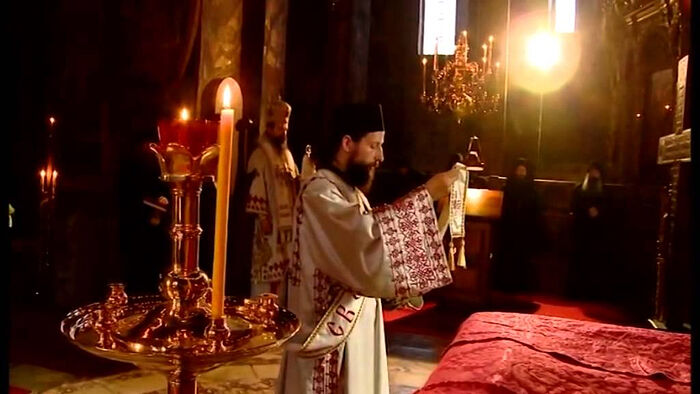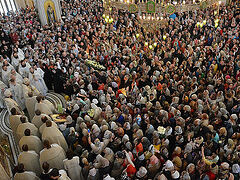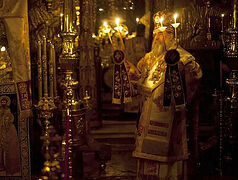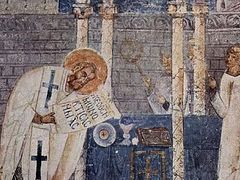Many of the faithful at church will not hear or know about this sentence of just eight words. The Royal Doors and curtain are closed; those in the sanctuary cannot be seen or heard. This sentence is spoken quietly by the deacon to the priest just before the start of the Divine Liturgy, or spoken by the priest if there is no deacon. We should know about and understand the meaning and importance of these words (which come from Psalm 118 [LXX], verse 126).
To do so, we need to refer to the original Greek of verse 126: Καιρός τοῦ ποιῆσαι τῷ Κυρίω. Kairos does not mean chronos, clock time, but a juncture when it is right or proper to do something, the opportune moment. In the context of the Divine Liturgy, it is when God acts, not the clergy or the people. We see this in Mark 1:15 where Christ says: The time [Kairos] is fulfilled, and the kingdom of God is at hand. In John 7:6, Christ says, My time [Kairos] has not yet come, meaning that then was not the right or propitious time for His Passion and Crucifixion. And in John 7:8, Christ says He will not go up to the Feast of Tabernacles, for My time is not yet full come. In such passages, we can see that kairos has to do with the proper time for God to carry out His purpose.
Poiesai comes from the verb which means to cause, to bring about, to create, to act. It is the root of the English word, “poem”. The same verb used in the Greek Septuagint, Chapter 1 of the Book of Genesis, to describe God’s creating the world.
One writer1 describes the meaning of the sentence thus:
“Christ’s time (Kairos) . . . It is time to yield our place to the Lord, so that He Himself may become the celebrant of the service of our offering, and accept it, and that He may be given to us . . . Through the Liturgy, God continues His work of creation: He recreates man and the world.”
The same writer goes on say that, “Christ’s time, His Kairos, is also His glory which is to come”, and then quotes St Cyril of Alexandria who has Christ say:
“I await the time of the true assembly, which is not yet full come. For then, then shall I be together with My company rejoicing in the brightness of the saints, in the glory of the Father, flashing forth extreme brilliance.”
and adds that Christ calls the time His own.
The Divine Liturgy is so called because it is the act of God the Father and the Holy Spirit, and of Christ as the great High Priest celebrating through the priest. It is the activity of the Holy Trinity operating in the world at the opportune moment in time and in space, connecting the Divine Liturgy celebrated on earth with that in Heaven. We are in the sinful world where God’s precepts have not been kept, and God acts to save the world; thus, it is through the Divine Liturgy that God is continuing His work of salvation.
But that is not all. In his Commentary on Psalm 118, St Theophan the Recluse writes that the sentence, “It is time for the Lord to act” “may be used before the beginning of any event, especially prayer. Anyone who starts to pray may say to himself: You have been busy with worldly things; now it is time to begin God’s business, to work for God.”




